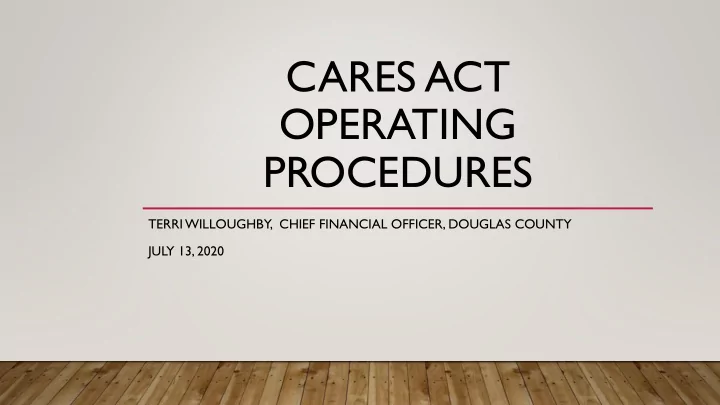

CARES ACT OPERATING PROCEDURES TERRI WILLOUGHBY, CHIEF FINANCIAL OFFICER, DOUGLAS COUNTY JULY 13, 2020
IMPORTANT CONSIDERATIONS • Policies: • Grant Policy, including Sub recipient Monitoring and Cash Management. • Anyone that you pass funding through to is held to same guidelines as your agency. • Having policies in place give clear guidance to all who may be involved (including non-Finance folks). • Procurement/Purchasing Policy – makes sure it includes reference to following Federal Guidelines.
IMPORTANT CONSIDERATIONS • Documentation • Engage your legal team now • Draft Sub award agreements to spell out requirements. • Meet with key players in other departments to explain requirements and documentation needed. • Purchase requisitions and invoices should clearly how this expense is related to the COVID-19 pandemic. No one will remember why the purchase was eligible for COVID when you’re being audited. Get it now. • “Expenses must be used for actions taken to respond to the public health emergency. These may include expenditures incurred to allow the State, territorial, local or Tribal government to respond directly to the emergency, such as addressing medical or public health needs, as well as expenditures incurred to respond to second-order effects of the emergency, such as by providing economic support to those suffering from employment or business interruptions due to COVID-19- related business closures”
IMPORTANT CONSIDERATIONS • Audit Documentation • Call your auditor now. Considerations to be discussed: • Single Audit Year? • How to handle expenses in FY 2019-20, Award and Revenue in FY 2020-21 • Tracking (Multiple Catalog of Federal Domestic Assistance (CFDA) programs and numbers-how to segregate.
CARES ACT PROCUREMENT Purchase Amount (Aggregate- Purchase Amount (Revised OMB) NDAA in 2019) Federal Purchase Classification Purchasing Methodology $0-$3,500 $0-$10,000 Micro-Purchase * No quotations needed, price must be reasonable * To the extent practical, distribute purchases equitably among suppliers * Get quotations from an adequate (more than one) number of suppliers and document why the $3,501-$150,000 $10,001-$250,000 Small Purchase number of quotes is adequate Over $150,000 Over $250,000 Sealed Bid * Complete, adequate and realistic specification or purchase description is available * 2 or more responsible bidders are willing and able to compete effectively for business * Purchase lends itself to a firm fixed price contract * Selection of bidder is made principally on price Over $150,000 Over $250,000 Competitive Proposals * Used when conditions are not appropriate for a sealed bid procurement * Requests for proposals must be publicized and identify all evaluation factors & importance of each factor * Proposals must be solicited from an adequate number of qualified sources * Evaluating agency must have a written method for conducting technical qualifications of proposals * Contracts must be awarded to the responsible firm whose proposal is most advantageous, with price and other factors considered * Awarding agency must use competitive proposal procedures for qualifications -based procurement Any amount Any amount Non-competitive proposals * Item is available only from one source * Public exigency or emergency will not permit a delay resulting from competitive solicitation * Federal awarding agency (or pass-through agency) must authorize noncompetitive proposals in response to a request from non-Federal agency * After solicitation of a number of sources, competition is determined inadequate
CARES ACT PROCUREMENT • General Guidelines: • Purchases must comply with your agency’s purchasing policies and NRS • Purchases must be deemed necessary to carry out the goals and policies of the CARES Act. • Purchases must be made with open competition to the extent required. • Must comply with conflict of interest laws and policies. • The purchase documentation contains a sufficient and proper history of the purchase. • No local preference allowed under Federal guidelines.
CARES ACT PROCUREMENT • Suspension and debarment: • Non-Federal entities are prohibited from contracting with or making sub awards to parties that are suspended or debarred. • Non-Federal entities must verify that the entity is not suspended or debarred before entering into a transaction (and you must be able to prove that you did this before the contract is finalized). Attach a screenshot of the verification to the contract when executed and keep on file. • You can verify by checking the Excluded Parties List System (EPLS): https://www.sam.gov/SAM/pages/public/searchRecords/advancedPIRSearch.jsf • You can also add language to contract or request a certification.
GRANT PROCUREMENT TOP MISTAKES 1. Restricting full & open competition 2. Not performing detailed price or cost analysis for procurement >$250,000 3. Engaging in sole-source procurement without documenting emergency or exigent situation 4. Continuing work under sole-source contract after the urgent need is ended 5. Not making (or not documenting) taking all required steps 6. Awarding a time-and materials contract without a ceiling price and documenting why no other contract type is suitable 7. Not including required contract clauses 8. Awarding a “cost -plus- percentage of cost” or “percentage of construction cost” contract 9. Awarding a contract to contractors that are suspended or debarred 10. Not documenting procurement steps to answer questions that will arise later (months/year) Source: https://www.fema.gov/procurement-disaster-assistance-team
RESOURCES Treasury Guidance: https://home.treasury.gov/policy-issues/cares/state-and-local-governments Government Finance Officers Association (www.gfoa.org) Coronavirus Response Resource Center: https://www.gfoa.org/coronavirus Fiscal First Aid: https://www.gfoa.org/ffa Grants.Gov Learning Center: https://www.grants.gov/web/grants/learn-grants.html NACO (National and State)
Recommend
More recommend